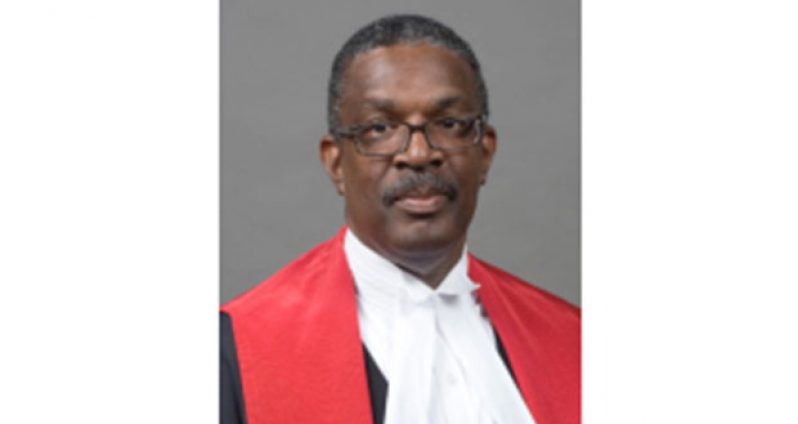– SASOD calls on Guyana gov’t to also repeal laws here
GUYANA’S law banning same-sex intimacy between consenting adults should be repealed, SASOD said Wednesday after a landmark ruling by the Belize Supreme Court.Caleb Orozco, a gay man in Belize, had in 2010 filed a constitutional challenge to section 53 of the Criminal Code, which makes “carnal intercourse against the order of nature,” which includes anal sex, a crime punishable by up to 10 years imprisonment.

Orozco said the law violates his constitutional rights and that of many other Belizeans, to human dignity, privacy and equality before the law because it criminalises sexual intimacy between consenting adults, even in private.
In what human rights organsiations are calling a ground-breaking decision, Belize’s Chief Justice Kenneth Benjamin ruled that the law is inconsistent with the Constitution of Belize, because it violates the right to human dignity, privacy, freedom of expression and non-discrimination and equality before the law and equal protection of the law.
The court then “read down’” S. 53 of the Criminal Code to exclude consensual sexual acts between adults in private.
Mr Benjamin is a national of Guyana and Antigua. After law school, he returned to Guyana where he practised privately and also served as a magistrate and assistant judgeadvocate for the Guyana Defence Force.
SASOD, the Society Against Sexual Orientation Discrimination, in reacting to the ruling said that the Belize Supreme Court is on the right side of history.
Joel Simpson, Managing-Director of SASOD, said the Orozco case is the first to examine the constitutionality of laws which criminalize same-sex intimacy in private, noting that the court also broke new ground by ruling that the term “sex” in the Constitution of Belize also means sexual orientation, which is consistent with Belize’s international obligations.
He noted that Guyana has similar laws which criminalize specific kinds of consensual sexual relations in private n sections 351 to 353 of the Criminal Law Offences Act.
“As a Commonwealth Caribbean country with a similar constitution, the Belize decision would be considered highly persuasive to Guyana’s courts.
“And Guyana’s constitutional protection of fundamental rights and freedoms is the strongest in the Caribbean Region, because of the 2003 reforms,” he stated.
According to Simpson, Guyana’s constitution directly incorporates seven international treaties.
“Undoubtedly, laws criminalizing consensual same-sex intimacy between adult men in private are similarly unconstitutional,” he stated.
As such, SASOD urged the Granger administration to repeal these laws forthwith.
“It’s a waste of state resources to be defend these patently discriminatory laws.
“The coalition campaigned and has several times reinforced its commitment to equal rights, justice and a good life for all Guyanese.
“President Granger has said ‘include all, exclude none’,” Simpson stated.
He said these “punitive laws are the institutional basis for exclusion and marginalization of Lesbian, Gay, Bisexual and Transgender (LGBT) Guyanese, which perpetrate the violence and discrimination our communities face by police, other state officials and by people in society.
“SASOD calls on the coalition to demonstrate fortitude and leadership by repealing these laws in the National Assembly,” Simpson declared.
On Wednesday, Orozco was accompanied in the Supreme Court by his sister Golda Neal, who sat beside him in court, two of his lawyers, Lisa Shoman SC and Westmin James, the President of United Belize Advocacy Movement ( UNIBAM) Simone Hill, other UNIBAM members and many other supporters of the litigation. A representative of PETAL (Promoting Empowerment through Awareness for Lesbian and Bisexual Women) said they were there because the Orozco case “is about the human rights of all.”
Orozco serves as Executive Director of the United Belize Advocacy Movement (UNIBAM), a policy and advocacy human rights NGO working to advance the rights protection and enforcement for LGBT persons, which is also an interested party in the case.
After court, Orozco said that today “is a proud day with a history-making judgment for Belize, the country which I am proud to call home. Our courts are there to protect us all. In striking down Section 53, we have reaffirmed ourselves—consistent with the Belize Constitution—as a society built on dignity and respect for all.”
After court, President of UNIBAM, Simone Hill stated that “This case is an important part of the march forward in Belize and the Caribbean towards dignity and respect for the human rights of all. Decisions throughout Caribbean history that have had advanced human rights have not been decisions arrived at easily or quickly.”

Laura Tucker-Longsworth, chairperson of the National AIDS Commission of Belize, says that “section 53 is a national issue, because it has implications for HIV prevention and care. Education is key for creating meaningful change in our society.”
Mrs Kim Simplis Barrow, the Special Envoy for Women and Children, said: “It’s a great day for Belize, it’s a great day for human rights; one step closer to dignity and the respect we all deserve.
Belizean indigenous leader and environmentalist Cristina Coc of Maya Leaders Alliance, and awardee of the prestigious Equator prize in December 2015, also welcomed the decision.
She commented: “We are equally responsible to ensure STATE Accountability to protect the human rights of ALL and not SOME! Therefore, all laws, policies and actions must be consistent with the CONSTITUTION.
“The Issue of non-discrimination must not be overlooked. No one person, group or community should be discriminated against because of the colour of his or her skin, his or her choice of religious belief, his or her ethnicity, or his or her sexual orientation. It is our duty to give effect to and reinforce the highest law of Belize – the CONSTITUTION.”
Westmin James, one of the lawyers and member of the Faculty of Law UWI Rights Advocacy Project (U-RAP), which helped to launch the case, said: “This decision is a brave step in the recognition of the human rights of all persons in Belize and will go a long way in promoting the human rights and equality of all LGBT persons in the Caribbean.”



.jpg)








